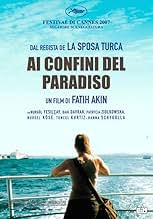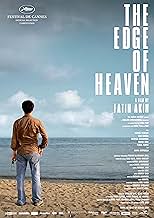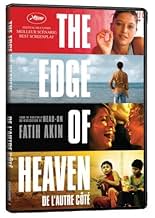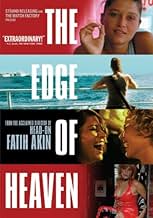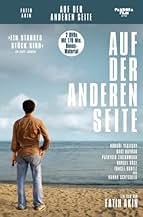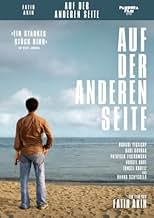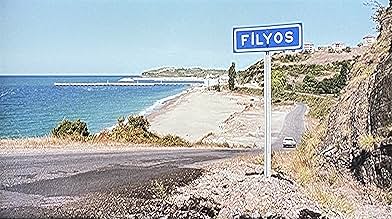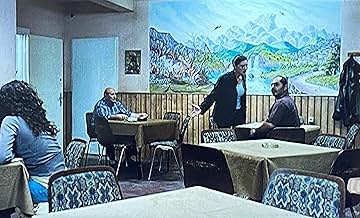AVALIAÇÃO DA IMDb
7,7/10
35 mil
SUA AVALIAÇÃO
Um turco viaja para Istambul para encontrar a filha da ex-namorada de seu pai.Um turco viaja para Istambul para encontrar a filha da ex-namorada de seu pai.Um turco viaja para Istambul para encontrar a filha da ex-namorada de seu pai.
- Direção
- Roteirista
- Artistas
- Prêmios
- 37 vitórias e 22 indicações no total
Avaliações em destaque
Faith Akin, renowned for his energetic movie 'Gegen die Wand', brings another story about the Turkish-German community. The movie focuses on three families who are all connected in some way. In a beautiful way Akin shows the struggle of a Turkish prostitute, a professor of German literature, a young Turkish rebel, a student English and Spanish and a retired widower to find peace and happiness in their lives. Akin manages to avoid the many pitfalls which can lead to clichés. The characters remain just ordinary people with genuine emotions and problems. The movie also depicts the impact of globalization and multiculturalism in nowadays Germany and Turkey. It's the most debated topic of our time. To what extent do we want newcomers to adapt to their new surroundings and to what extent do we accept them to cherish their own cultural heritage. In an even broader perspective, it deals with the clash between the Islamic and western world. 'Auf der anderen Seite', which means on the other side, shows how Turkish immigrants come to love their new country, Germany, without losing their Turkish roots. I think Akin invites us to try and imagine the backgrounds of people, so there will be less misunderstanding. This view is symbolized by Lotte, a German student, who decides to help Ayten, a Turkish political activist who fled Turkey. She doesn't know the Turkish girl but just wants to help her, because the girl has nowhere to go. This quest even brings her to the shores of Istanbul, a city where East meets West in the most literal way.
In the end, 'Auf der anderen Seite' is a story of love and hope which is most endearing and sheds a refreshing light on the global trend of clashing cultures. Any one who is interested in these topics and just loves a very well made movie, ought see this German-Turkish production!
In the end, 'Auf der anderen Seite' is a story of love and hope which is most endearing and sheds a refreshing light on the global trend of clashing cultures. Any one who is interested in these topics and just loves a very well made movie, ought see this German-Turkish production!
"Auf der anderen Seite" is the first Faith Akin-movie I have seen, and I was surprised by how balanced and mature it was. Looking at Akin's young age and the "gang"-background of his youth, I was expecting something much louder, more brutal, more explicit, more devastating. What "Auf der anderen Seite" is, is a deeply humanistic and thoughtful movie.
The thing that I loved most about it, is that every single character is written so well. No one is a villain or a bad person per se, they're all just human, struggling to do what they think is right. The actors and actresses portraying these characters are fabulous. I've rarely seen such convincing and natural performances.
Finally, the story itself is original, unagitated and beautiful. The individual plot lines don't come together as you think they would or as you think it might be best for the characters. When the movie ends, you will find that everything did resolve in a way. It's hard to explain it, if you haven't seen it. Let's just say this: "Auf der anderen Seite" doesn't have the average Hollywood-solution, but it will leave you with a lot to think about when the credits quietly start running.
This movie really impressed me, and I can't wait to finally see Akin's other works. Apparently Germany's finally got a really interesting filmmaker deserving of all the praise he gets.
The thing that I loved most about it, is that every single character is written so well. No one is a villain or a bad person per se, they're all just human, struggling to do what they think is right. The actors and actresses portraying these characters are fabulous. I've rarely seen such convincing and natural performances.
Finally, the story itself is original, unagitated and beautiful. The individual plot lines don't come together as you think they would or as you think it might be best for the characters. When the movie ends, you will find that everything did resolve in a way. It's hard to explain it, if you haven't seen it. Let's just say this: "Auf der anderen Seite" doesn't have the average Hollywood-solution, but it will leave you with a lot to think about when the credits quietly start running.
This movie really impressed me, and I can't wait to finally see Akin's other works. Apparently Germany's finally got a really interesting filmmaker deserving of all the praise he gets.
This is the "Short Cut" concept once again, but in a much more clever way. It says that everybody are destined to get together. For better and for worse. We don't know it, but our movie audience understands.
This is also about the relation between Germany and Turkey and West and East at the present moment. The two are closer now than they used to be, but both parts are still hurt after each meeting. Unconditional love is hard to reach, but people try, without knowing it.
A movie about sadness but also a little about hope. Many things are too late, but some things aren't. You'll definitely sit through the final scene, for reasons which shall not be mentioned here.
This is also about the relation between Germany and Turkey and West and East at the present moment. The two are closer now than they used to be, but both parts are still hurt after each meeting. Unconditional love is hard to reach, but people try, without knowing it.
A movie about sadness but also a little about hope. Many things are too late, but some things aren't. You'll definitely sit through the final scene, for reasons which shall not be mentioned here.
I usually comment on films right after I've seen them. However, "Auf der anderen Seite" (The Edge of Heaven), touched me in a way that few films do, so a month has passed.
This story of two sets of mothers and daughters, a father and his son...and a gun seems familiar, but its resolution is anything but. To lay out the plot would be daunting. So much ground is covered, yet it unfolds effortlessly. F a t i h Akin's screenplay is elliptical--the story starts where it finishes--but by the end, when the opening scene is replayed, our journey with these characters puts us, indeed, on the edge of transcendence.
Amid the desperation on display, small details brim over the images: a son waters his father's tomato plants pausing to taste the ripened fruit, a mother pits cherries that stain her fingers, another manicures her nails to avoid a quarrel, we imagine a bookstore's--specifically a German language bookstore in Istanbul--smell and the safety it can bring to a foreigner.... These domestic details are set against much larger, although finally insignificant, struggles: the cultural divide of immigrants, students revolting against an oppressive government, how imprisonment can deaden the soul. But F a t i h Akin wants the basic struggles of family bonds to be central here. It's the resolution of family rifts--small and large, emotional and physical--that are urgent.
The choice of settings, music, lighting... all carefully selected to build toward one moment that catches us off guard. When a foreigner asks "What is Kurban Bayrami?" (a Turkish holiday) the many seemingly disparate elements that we've been watching--in good faith because they're so rivetingly told--suddenly come together, it almost knocked the breath out of me.
Whether or not we as viewers have lost a father or mother or a child, through death, physical separation or emotional turmoil, we can understand what these characters suffer. And how all that can be healedthe willingness to have faith that good intentions can mend this troubled worldis something like a miracle to find illustrated on film. The weapons these characters lay down to pursue goodness don't necessarily have the effect they intend, but as we watch lives torn apart and then healed we see what they don't. And we carry that lesson out of theater with us.
This story of two sets of mothers and daughters, a father and his son...and a gun seems familiar, but its resolution is anything but. To lay out the plot would be daunting. So much ground is covered, yet it unfolds effortlessly. F a t i h Akin's screenplay is elliptical--the story starts where it finishes--but by the end, when the opening scene is replayed, our journey with these characters puts us, indeed, on the edge of transcendence.
Amid the desperation on display, small details brim over the images: a son waters his father's tomato plants pausing to taste the ripened fruit, a mother pits cherries that stain her fingers, another manicures her nails to avoid a quarrel, we imagine a bookstore's--specifically a German language bookstore in Istanbul--smell and the safety it can bring to a foreigner.... These domestic details are set against much larger, although finally insignificant, struggles: the cultural divide of immigrants, students revolting against an oppressive government, how imprisonment can deaden the soul. But F a t i h Akin wants the basic struggles of family bonds to be central here. It's the resolution of family rifts--small and large, emotional and physical--that are urgent.
The choice of settings, music, lighting... all carefully selected to build toward one moment that catches us off guard. When a foreigner asks "What is Kurban Bayrami?" (a Turkish holiday) the many seemingly disparate elements that we've been watching--in good faith because they're so rivetingly told--suddenly come together, it almost knocked the breath out of me.
Whether or not we as viewers have lost a father or mother or a child, through death, physical separation or emotional turmoil, we can understand what these characters suffer. And how all that can be healedthe willingness to have faith that good intentions can mend this troubled worldis something like a miracle to find illustrated on film. The weapons these characters lay down to pursue goodness don't necessarily have the effect they intend, but as we watch lives torn apart and then healed we see what they don't. And we carry that lesson out of theater with us.
In his film The Edge of Heaven (2007), under original title Auf der anderen Seite (On the Other Side), Fatih Akin, a German writer-director of Turkish parentage, intertwines two stories, whose protagonists get caught in seemingly hopeless situations, both resulting in individual tragedies, stories with a cross section on the character of a young Turkish German professor, Nejat Aksu (Baki Davrak) whom we first meet living in Bremen and lecturing in the German literature university classes, who returns to Turkey, on a (futile?) quest for the lost daughter of his father's suddenly deceased girlfriend, and (unexpectedly?) stays there where he, quite appropriately to his vocation and interests, buys and maintains an Istanbul bookstore with exclusively German books (or books translated in to German) on offer, two stories which gradually approximate each other, but never actually "resolve" one in to another. Still, the end is open, with the possibility for resolution, future cleansing what-so-ever, of the souls heavily burdened with guilt from the past.
Film touches real life situations, ranging from usual family tensions and quarrels, through losses suffered due to physical separation or emotional disorder, all the way to ultimate loss, death of the dear one, and in doing so engages audiences on the first-person level, because nobody is spared from at least a single such experience, or two or more. Such an easy and deep identification with on-screen happenings, with how they develop, how they are mended or not... is what we feel all along, and what we carry out of the theatre when the film is over... Split between two sides, Life and Death on the edge, but who's to tell which side is the Heaven and which one is the Hell?
Heavy matters tackled, yet easy to relate to, feel for affected characters and empathize with them, in an emotionally charged and very engaging film.
Film touches real life situations, ranging from usual family tensions and quarrels, through losses suffered due to physical separation or emotional disorder, all the way to ultimate loss, death of the dear one, and in doing so engages audiences on the first-person level, because nobody is spared from at least a single such experience, or two or more. Such an easy and deep identification with on-screen happenings, with how they develop, how they are mended or not... is what we feel all along, and what we carry out of the theatre when the film is over... Split between two sides, Life and Death on the edge, but who's to tell which side is the Heaven and which one is the Hell?
Heavy matters tackled, yet easy to relate to, feel for affected characters and empathize with them, in an emotionally charged and very engaging film.
Você sabia?
- CuriosidadesNurgül Yesilçay - who is a big star in her native Turkey - had doubts about taking on the part of Ayten as she wasn't sure how audiences would react to seeing her as a revolutionary lesbian.
- Erros de gravaçãoIn the film, the year is 2006 and it is the Festival of Sacrifices (Kurban Bayrami), a religious holiday. Everybody is in summer clothes and many of them are sweating. The Festival of Sacrifices in 2006 in Turkey was in winter, at the end of December.
- Citações
story: After telling the story of Abraham that was willing to sacrifice his son, Ismael, to show God his obedience. Before Abraham could slay his son God sent a lamb to sacrifice instead.
Nejat Aksu: I asked my dad if he would have sacrificed me as well.
Susanne Staub: And what did he say?
Nejat Aksu: That he would even make an enemy of God to protect me.
- Cenas durante ou pós-créditosThe film's title appears twice: in the middle of the film at 1 hour 25 mins and after the end credits.
- ConexõesFeatured in Fatih Akin - Tagebuch eines Filmreisenden (2007)
Principais escolhas
Faça login para avaliar e ver a lista de recomendações personalizadas
- How long is The Edge of Heaven?Fornecido pela Alexa
Detalhes
- Data de lançamento
- Países de origem
- Centrais de atendimento oficiais
- Idiomas
- Também conhecido como
- The Edge of Heaven
- Locações de filme
- Empresas de produção
- Consulte mais créditos da empresa na IMDbPro
Bilheteria
- Faturamento bruto nos EUA e Canadá
- US$ 742.349
- Fim de semana de estreia nos EUA e Canadá
- US$ 14.257
- 25 de mai. de 2008
- Faturamento bruto mundial
- US$ 17.804.565
- Tempo de duração1 hora 56 minutos
- Cor
- Mixagem de som
- Proporção
- 1.85 : 1
Contribua para esta página
Sugerir uma alteração ou adicionar conteúdo ausente


